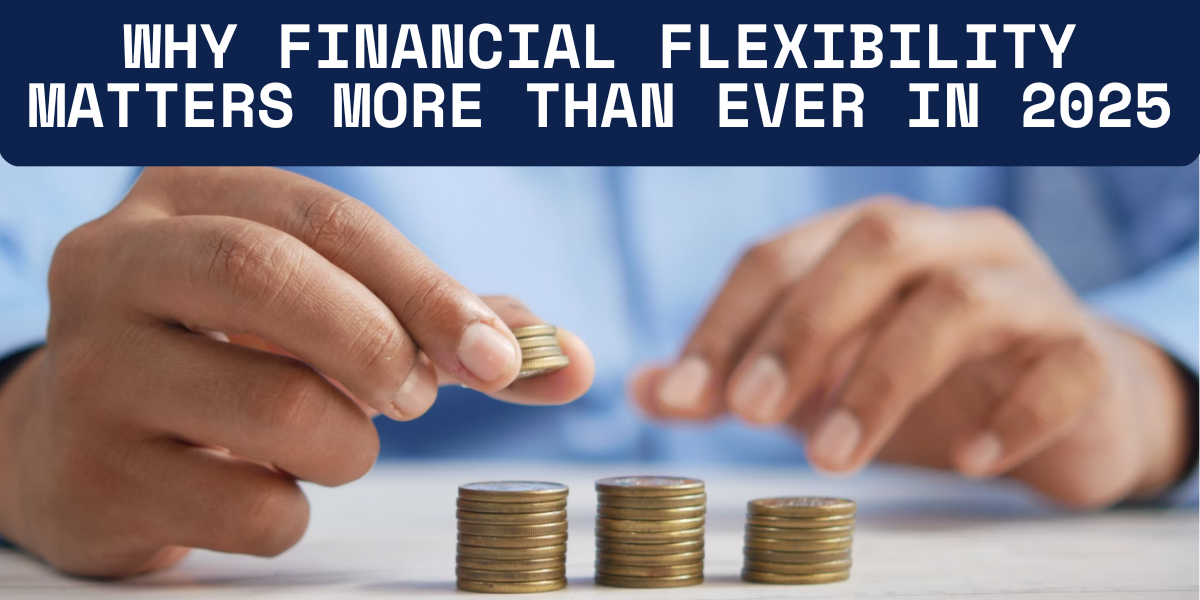In 2025, financial flexibility is not a luxury — it is a necessity. The combination of rising living costs, unpredictable markets, and a shifting employment landscape has placed new pressure on American households. Consumers can no longer rely on rigid financial routines to stay afloat.
Instead, success requires the ability to pivot. Flexibility means more than having savings — it means using tools and systems that respond quickly to change. From digital banking to same-day liquidity, Americans are demanding access, speed, and control. This shift reflects a broader economic reality — agility is the new financial strength.
The Economic Landscape Has Changed
The post-pandemic economy has revealed structural fragilities. Although unemployment remains relatively low, inflation has pushed up daily expenses across major categories — food, energy, rent, and health care. This persistent rise in costs, combined with fluctuating interest rates, has left many consumers feeling uncertain.
In this environment, conventional budgeting strategies are less effective. Locking money into traditional accounts or long-term investments can backfire when short-term disruptions occur. As a result, individuals are searching for faster ways to respond to financial stress while preserving their long-term financial goals.
Defining Financial Flexibility in 2025
Financial flexibility refers to a person’s ability to adjust spending, manage cash flow, and access funds quickly without compromising their overall financial health. It is not about living paycheck to paycheck or accumulating debt.
Instead, it means planning for unexpected costs — such as car repairs, medical emergencies, or income gaps — using a combination of savings, smart borrowing, and real-time budgeting tools. The goal is to prevent small setbacks from becoming long-term financial problems.
How Americans Are Rethinking Their Financial Toolkit
Today’s consumers are embracing a new generation of financial tools. Traditional banks are no longer the only option for savings, credit, or budgeting. People are opting for:
- Mobile-first banking platforms
- Real-time budgeting and alert tools
- Same-day earnings access
- Emergency fund automators
- Peer-to-peer lending services
This transition is being driven by urgency. With rising prices and unpredictable expenses, many Americans can’t afford to wait days for funds or jump through rigid credit approval hoops. They’re looking for fast, low-friction solutions that give them control over timing — especially when life provides a bill at the wrong moment.
In this environment, online instant loans have emerged as a viable financial bridge. Unlike traditional personal loans where the funds may take days to become available, these products offer near-immediate access to cash for pressing needs like car repairs, rent, or overdue utilities.
When used responsibly, these types of loans can help prevent missed payments or further financial setbacks, giving consumers room to breathe while staying on track with long-term goals.
Planning Strategies That Support Flexibility
While access is key, true financial flexibility starts with preparation. One strategy is segmented budgeting, where income is divided into clear buckets for essentials, savings, and unexpected costs. This method ensures that funds are available when needed.
Another is using apps that automate contributions to sinking funds (money set aside regularly for a specific, planned future expense). For gig workers or freelancers, maintaining flexible invoices and planning quarterly expenses can provide extra breathing room. Flexibility depends on visibility — and that requires proactive planning.
Speed Is Becoming a Core Requirement
Financial flexibility used to mean having emergency savings. While that still matters, speed is now a central factor. A delayed paycheck or surprise bill can trigger late fees, lost accommodation, or credit score damage. The timeline between problem and resolution is shorter than ever.
Digital financial platforms have responded. Services offering rapid underwriting, early direct deposit, or instant credit approval are gaining traction. The speed is not about convenience — it’s about preventing damage before it occurs.
Emotional Stability Through Financial Confidence
Beyond numbers, flexibility brings peace of mind. When individuals know they have a plan for unexpected costs, they are more likely to stay calm and make smart decisions. This mental clarity helps avoid panic spending or poor borrowing choices.
Stress can amplify financial problems. Having multiple options — whether it is access to savings, support from family, or a trusted lending source — provides a psychological safety net that empowers better outcomes.
Building a Resilient Financial Life
A flexible financial plan is not static. It evolves with your needs, income level, and life goals. For 2025, this means blending traditional strategies like savings with modern tools that allow for real-time action.
When consumers face a tight spot, online instant loans can offer a structured, time-sensitive solution. Used wisely, they serve as one of several options for navigating life’s curveballs. This balanced approach can help individuals meet both their short-term and long-term objectives.
Agility Is the New Security
In today’s economic climate, agility is more powerful than accumulation. The ability to respond, shift, and recover from financial disruption defines success in 2025. Flexibility does not mean giving up control — it means gaining the tools to stay in control, no matter what life brings.
FAQs
What Does Financial Flexibility Mean in 2025?
Financial flexibility means having the tools and habits to manage unexpected costs without long-term setbacks. This includes budgeting smartly, using tech-enabled tools, and accessing fast liquidity when needed.
Are Online Instant Loans a Safe Option for Emergencies?
Yes, if used responsibly and sourced from reputable providers. These loans can offer quick cash access when traditional credit takes too long, but borrowers should understand repayment terms before proceeding.
How Can I Start Improving My Financial Flexibility Today?
Begin by tracking your monthly expenses and identifying areas to reduce fixed costs. Next, set up automatic savings and explore financial apps that give real-time insights into your spending and balances.


 Tags:
Tags:










